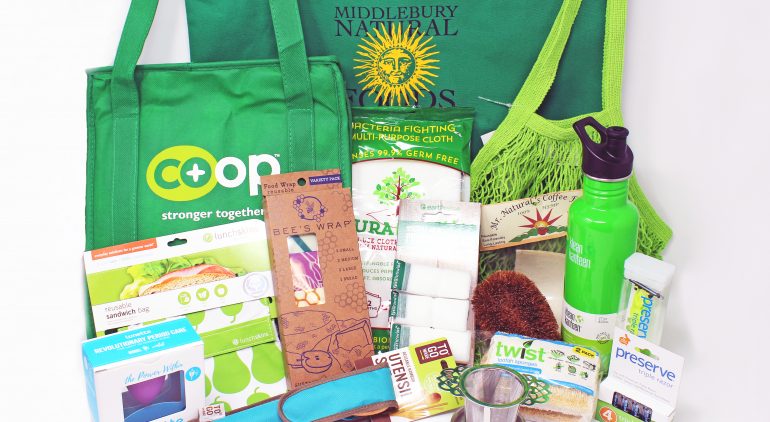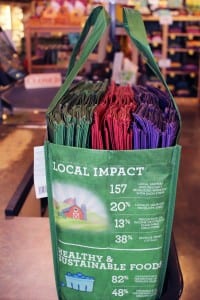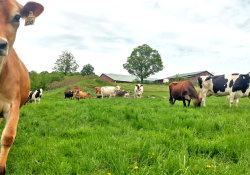
Going Bagless for Earth Day!
Monday, April 22nd is Earth Day, and in honor of this fine holiday, we’re going bagless! The day will serve as a great reminder that there are many ways to bag your groceries, so why not choose the GREEN way? Please bring your baskets, reusable bags, repurposed cardboard boxes, or any grocery tote you prefer. If you forget, no problem; we’ll be giving away free reusable bags while supplies last, and we’ll also have repurposed cardboard boxes available.
Stop by the Co-op on 4/22 and enter our Raffle to win the earth friendly “Reusables Rejoice” prize pictured above!
Why bother with reusable grocery totes? Here are some interesting facts about disposable shopping bags:
While disposable paper and plastic bags seem awfully convenient, their cost to the environment can be hefty.
Plastic Bags
It is estimated that 5 trillion plastic bags are produced each year. Each plastic bag is used, on average, for about 20 minutes, though it takes a single bag over 1,000 years to completely decompose in a landfill. As it decomposes, it releases greenhouse gases into our atmosphere and releases harmful toxins into our soil and groundwater. Bags that don’t make it to the landfill litter the landscape and pose a significant threat to animal health and well-being; particularly for birds and aquatic life.
Plastic bags are quite commonly mistaken for food by animals, especially when the bags carry food residues, are brightly colored or are animated by the movement of water. A great variety of animals, land and especially marine, can choke to death on bags. If swallowed whole, animals may not be able to digest real food and die a slow death from starvation or infection. Plastic bags are responsible for the death of over a million seabirds and an estimated 100,000 whales, dolphins, turtles, and seals each year.
Americans throw away about 100 billion plastic bags annually. That is equivalent to dumping nearly 12 billion barrels of oil. But, what if you recycle them? That seems like a more environmentally-friendly way to go, right? Unfortunately, it takes 85 times more energy to recycle a plastic bag than it does to create it.
Paper Bags
Perhaps you opt for paper bags, instead of plastic. Those are better for the environment, right? Believe it or not, paper production creates 70% more pollution during production than plastic bags. One must also consider that paper bags are made from trees that could instead be absorbing carbon dioxide from our atmosphere if they weren’t busy becoming bags. The paper bag making process also results in 50 times more water pollutants than making plastic bags and uses more water during production.
While it’s true that plastic bags are made from crude oil, making a paper bag consumes four times as much energy as making a plastic bag, so the process of making paper bags consumes a good deal of oil as fuel for production, making both paper and plastic bags very oil-intensive products.
You can certainly recycle paper bags, though much like plastic bags, the process for recycling paper bags can be inefficient – often consuming more fuel than it would take to make a brand new bag.
In short, when it comes to the battle over which is greener, neither paper nor plastic has it in the bag.
Here are some great tips for remembering your reusable shopping bags:
- Keep your bags in your car or purse so you have them every time you go out.
- Make a note on your grocery list to grab the bags before you leave the house.
- Get the kids in on it! Have them be the ones to get excited and bring the bags with them when you take them along shopping.
- If you only have a couple of easy-to-carry items and are asked if you would like a bag, say ” no, thank you” If you are not asked if you would like a bag, say “I don’t need a bag, thank you.” Simple.
- If you do forget your reusable bags, check out the hallway area near the customer restroom. This area is often stocked with cardboard boxes from our deliveries, which are handy repurposed grocery totes.
- Keep in mind, however, that to get the full greenhouse gas benefit from a reusable bag, it must be reused over 100 times. Reusable bags are energy-intensive to produce, but if you reuse them often over the years, the benefits really add up!





